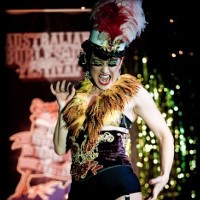

The Advertising Standards Bureau has upheld complaints about two advertisements from the Sydney Mardi Gras Festival and Universal Studios, which it found to be “highly sexualised” and depicting “inappropriate” sexual acts.
While there is debate about how far advertisers should be allowed to push the boundaries of what’s socially acceptable when it comes to using sexuality to sell their products, the advertising watchdog was prompted to act in these cases due to the likelihood of children seeing the ads.
The Sydney Mardi Gras ad, which was featured on a postcard from the Avant Card Company, featured an image created by artist Elvis Di Fazio in which a couple sat atop a kitchen bench. The man was naked and was shown sitting on the back of a female dressed in black underwear and fishnet stockings.
While the Sydney Mardi Gras name was not present on the advertisement, the postcard featured a hashtag being used to promote the event: #theresonlyoneparty.
The complaint received by the advertising bureau said the ad promotes “the sexual domination of females that reflects the message that this is acceptable and normal behaviour”.
“My concerns is that this postcard is freely available to people of any age including children in cafes, retail outlets, theatres, etc and that it sends a message that Australian society tolerates—indeed promotes—sexual domination of women and that the ideal female is one who is willing to go down on all fours to enable a man to ride her,” said the complainant.
“I am not complaining about a female’s choice of sexual practices and do not suggest that this act in itself is necessarily disempowering to females, it is the context—a postcard image with freely available without any context,” they said.
In response, the Sydney Mardi Gras said the postcard, which is no longer being distributed, “was in no way intended to demean or degrade women or to suggest any sexual subordination or domination”.
The festival said the woman featured in the ad was well-known burlesque artist Lillian Starr, “whose work challenges traditional notions of gender and sexuality through performance”. “Lillian was a key contributor in devising the image in which she appeared,” said the festival.

Burlesque performer Lillian Starr
However, the festival acknowledged that while the image was intended to be “attention-catching”, it accepted that “in isolation, the image in question may have been confronting for some people and the image could be misinterpreted without the appropriate context”.
Please click below to keep reading this article on page 2.


COMMENTS
SmartCompany is committed to hosting lively discussions. Help us keep the conversation useful, interesting and welcoming. We aim to publish comments quickly in the interest of promoting robust conversation, but we’re a small team and we deploy filters to protect against legal risk. Occasionally your comment may be held up while it is being reviewed, but we’re working as fast as we can to keep the conversation rolling.
The SmartCompany comment section is members-only content. Please subscribe to leave a comment.
The SmartCompany comment section is members-only content. Please login to leave a comment.